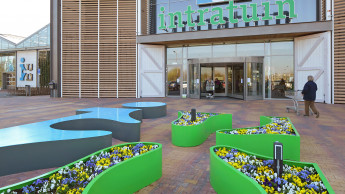Further processes of concentration within the DIY retail scene in Europe are in the air. This is the assumption upon which the UK market research company Verdict Research bases its latest study of the DIY market in Europe. The starting positions are clear. But how will the protagonists answer the sixty-four-thousand-dollar question: Who gets what?
Verdict arues that B&Q’s acquisition of an interest in Hornbach could have far reaching implications for other DIY players in Germany. By benefiting from lower purchasing costs and pursuing B&Q-style supply side efficiencies, Hornbach should be able to close the gap on its larger domestic rivals. Though other retailers are seeking to drive supply chain efficiencies their scope is limited.
Hornbach will have clear path
OBI, Praktiker and Toom are all part of larger retail groups that have many other interests beyond DIY. Hagebau is cooperatively owned, restricting ist acces to capital markets for investing in larger stores. Without a restructuring of these large retail groups, their opportunities for growth in Germany will be limited and Hornbach will have clear path.
The German market should be among the most attractive in Europe with the largest population of an country and the highest annual per capita expenditure. However since the boom years that followed unification, the German DIY market has suffered from overcapacity – it has the third highest area of DIY sales space per person – while challenging economic conditions have caused consumers to be reluctant about further home improvement spending.
Structural issues such as private cooperative ownership, and the conglomerate nature of Germany’s largest retailers, have prevented mergers to create fewer strong retailers, as has happened with the rise of Focus in the UK. German retailers have looked abroad for growth opportunities.
Attractive acquisition targets
In the UK, flotations of the country’s second and the third largest DIY retailers are set to take place during the course of 2002. Both could be attractive acquisition targets because of the continuing strong growth in UK DIY spending. The key question however ist by whom?
The most obvious candidate is Home Depot, but its international strategy has changed direction recently with a new focus on fast growing developing markets in Mexico and probably China, making an entry into a mature European market less likely. Also, Homebase’s soft end emphasis is at odds with Home Depot’s category killer model, while Focus’ varied store estate also reduces its attractiveness. B&Q is still the most obvious candidate for takeover by Home Depot, but this ist not likely in the near future as it concentrates on developing markets--nextpage--
A better strategic fit for Leroy Merlin
Verdict believes interest in Focus and Homebase is possible from other European retailers, especially interest in Focus from Auchan’s Leroy Merlin. It was in talks with Sainsbury when it decided to sell Homebase two years ago and may yet be tempted to make a new bid. Its expansion strategy has focused on developing positions in leading EU markets in addition to ermerging markets outside Europe. However Homebase is a different proposition today, shorn of its megastores and with a softer product offer, while Focus with its twin formats catering for mainstream DIYers and the building trade ist a better strategic fit for Leroy Merlin.
Alternatively, Focus and/or Homebase could turn predator in the European arena where, in the pursuit of scale, further consolidation is bound to occur. For the moment, they will be concentrating on their IPOs but beyond, both players understand that this is rapidly becoming a pan-European market.
Up to now, the European DIY market has had a fairly easy time in achieving meteoric growth and increasing consumer interest because of its relative immaturity. But things are now getting tougher. Consumers are now more discerning and require – indeed expect – a greater focus on their needs, wants and tastes. DIY retailers will increasingly need to look to the leading retailers in other sectors – such as grocers – to emulate some of their strategies of product and price architecture, sub branding and format segmentation. These are the factors the will underpin the winning formulae of the future.
Contact: retail@verdict.co.uk












